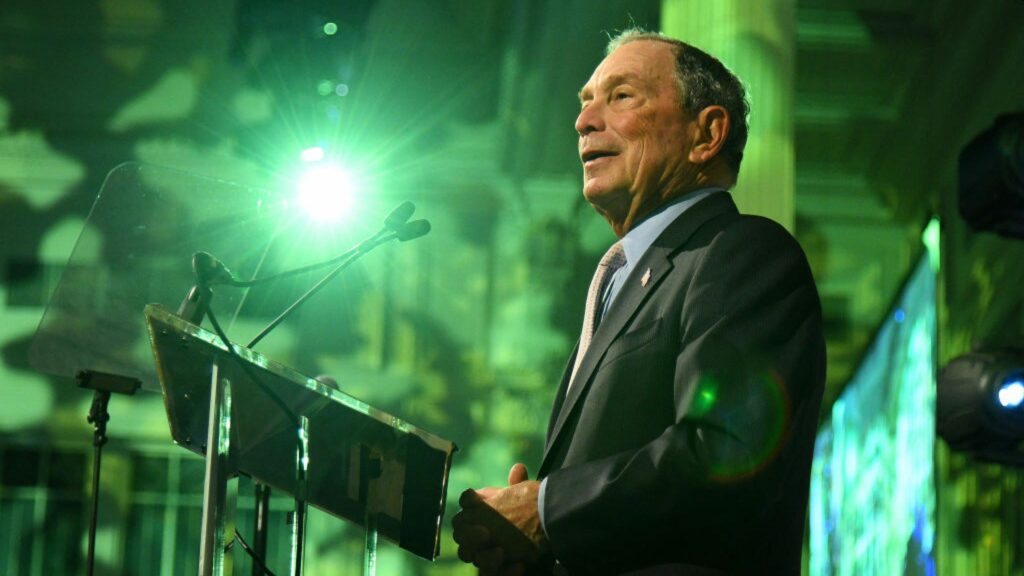
Honoree Michael Bloomberg speaks onstage during the Hudson River Park Annual Gala at Cipriani South Street on Oct. 17, 2019, in New York City.
Why you should care
Because the billionaire has money to spare — and knows how to win against the odds.
Former New York Mayor Michael Bloomberg’s entry into the presidential race, which he formally announced Sunday, has been accompanied by chatter from the political class that it makes no sense, there is no path and Democrats do not need another option. As a Republican, I have no say about whom the Democrats nominate. However, as a strategist who saw Bloomberg emerge onto the political scene in 2001, I can tell you this: Do not write him off.
Bloomberg announced his candidacy for mayor of New York City on June 5, 2001, via a 60-second commercial and large media buy (sound familiar?). His GOP primary opponent, Herman Badillo, was quick to say that Bloomberg was not really a Republican, was only using the party and could not buy the election (heard that one before?).
Then everything changed: Our nation was attacked on September 11, 2001, which happened to be primary day. We were all trying to process what had happened and yet, thanks to the tremendous leadership of Mayor Rudy Giuliani and Governor George Pataki, the primaries were rescheduled for just two weeks later.
Bloomberg crushed his severely underfunded primary opponent and went on to the general election, which, according to every pundit and political operative (including this one), there was no way he could win.
Mike Bloomberg does not take fliers.
Many people will tell you that the only reason Bloomberg won was because Giuliani — after 9/11, America’s Mayor was universally respected — endorsed him. The endorsement was critical but not the sole factor.
Bloomberg and his team are fierce political tacticians. They did not enter the race on a whim. Bloomberg’s television ads were good, the best money could buy, but the direct-mail operation was masterful. It appeared that each piece of mail was individually designed for each voter. The campaign’s use of technology to overlay the voter file with data was groundbreaking.
He proved his election was no fluke when he won re-election overwhelmingly in 2005. Then Bloomberg did the unthinkable: He garnered enough political support to convince the city council to toss out the mayor’s two-term limit, allowing him to run again in 2009. It is hard to explain just how shocking this was. Bloomberg also had to change his party registration to unaffiliated. And still, he won.
When Bloomberg left office, New Yorkers were happy to see the back of him. Twelve years was enough. However, Bloomberg was far from done. He’s given away billions through Bloomberg Philanthropies, including hundreds of millions to Everytown for Gun Safety and the American Cities Initiative. These two organizations alone provide Bloomberg with a vast ready-made national political network, rivaled in this field by only Sen. Bernie Sanders, due to his 2016 presidential run.
Bloomberg would not be running for president if there wasn’t a path — Mike Bloomberg does not take fliers. He is running a national campaign, opting to skip the early primaries, because his late entry doesn’t give him enough time to compete in early states. He likely won’t be able to qualify for the debates because he has said he won’t take donations, and the Democratic National Committee is requiring candidates to have 200,000 individual donors to make the December debate. But I don’t think Team Bloomberg cares. In fact, it might work in his favor. Bloomberg is not a great debater, and the other candidates would go after him nonstop. This way, he keeps his narrative on his terms.
His most important test will come on March 3, 2020. On Super Tuesday, 1,300 pledged delegates — about 35 percent of the total — are up for grabs in more than a dozen states, including California and Texas. With no winner-take-all states, the delegates will be split among several candidates. Bloomberg must come in first or second in delegates that day to prove he’s a contender.
So why does Bloomberg think he can pull it off? First, he has done his research, likely including a massive amount of polling. Second, with a net worth north of $50 billion, he has the money to be competitive, especially considering only three or four Democrats will likely have enough money to go beyond South Carolina. Lastly, there’s the impeachment trial of President Donald Trump.
The Senate trial — expected in January — will draw all eyes to Washington and take all of the senators off the presidential campaign trail (there are six still in the race). This provides an opportunity for Bloomberg to develop his own narrative. Money does not buy elections, as it can be spent foolishly, but expect Bloomberg to spend his sums wisely. He and his team know that television ads will not win this. They will develop a highly targeted campaign that most candidates can only dream of having.
He will face plenty of challenges, but Bloomberg proved in New York what he’s capable of. He should be viewed as a serious candidate, and you can’t count him out.

